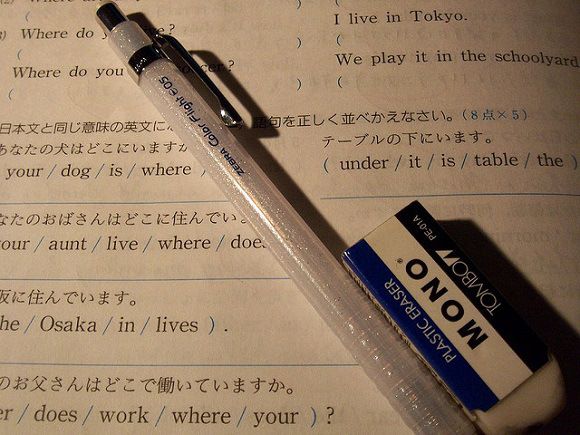TOKYO — When you speak to foreign English educators in Japan, one thing becomes crystal clear: English education in Japanisn't working. It's just awful. While English classes are mandatory in Japanese schools, the percentage of students who emerge with actual English abilities are surprisingly low. Students in China, Korea and Japan are in an arms race tosee who can produce students with the best English, and Japan seems to be trailing far behind in third place.
东京——当你同日本的外国英语教育者对话时,有一件事情变得非常明晰:英语教育在日本行不通。实在可以用糟糕来形容。虽然日本学校中实行强制性的英语课堂,可是拥有英语能力的学生少得可怜。中日韩三国的学生互相竞争看谁拥有最好的英语能力,而结果似乎是日本落在了第三名

With the Olympic Games coming up in 2020,the Japanese government has proposed changes to increase the level of English ability in their students. Changes like starting introductory English classesin 3rd grade elementary school and making the subject compulsory from the 5th grade. Are these changes really going to help? We've gathered opinions fromboth foreign teachers and Japanese citizens about issues with the system and what might improve it.
随着2020年奥运会即将到来,日本政府提议做出改变从而提升学生们的英语水平。比如在小学三年级就让学生学习一些入门的英语知识,以及在5年级时让英语学习成为必修课。这些举措真的有效吗?就这方面的问题,我们搜集了外国教师和日本民众的看法,看看如何提高日本的英语教育。
Every foreigner who spends any amount oftime in Japan will understand the fundamental need to change the way students study English. But a recent thread on the Japan subreddit, which seems to havebeen started by an English educator, tried to assemble as many opinions aspossible about the matter in one place. Many of the complaints fell into three main categories:
在日本呆过一段时间的外国人都会意识到有必要对日本学生学习英语的方法进行根本性的改变。最近网上有一名英语教育者发表了一个帖子,就这个问题激起了人们的讨论,很多抱怨可归到以下三种:
1. Teaching to the tests
应试教育
For those unfamiliar with the Japanese school system, most high schools and universities have a test that prospective students must take and pass. Especially in the case of high schools, there is amandated set of content that appears. And so, Japanese Teachers of English(JTEs) focus on the grammar and vocabulary that will be on the test. A broader understanding and the practical uses of English are largely ignored because they have to cover the specific material and don't have time for anything else.
在日本,大多数的中学和大学都有入学考试,想要就读的学生必须参加考试并通过才行。特别是中学,有一系列强制性的测试需要学生参与。所以为了应付这样的考试,日本的英语教师就把焦点放在了语法和词汇上了。对英语更广范围的了解和实际应用往往被忽视了。
So, if Japanese students have to learn specific material for the tests, why should they learn anything else? There isno point in actually learning the language if all that is required is being able to pick the correct answer on a multiple choice test. Many Japanese netizens agree, "Why change anything unless the style of testing is changed?"
所以,为了通过考试学生们不得不学习某些指定的英语素材,那他们还有必要学习英语其他方面的知识吗?如果学生们需要做的就仅仅是在多项选择题中挑选出正确答案,那么还有必要学习这门语言吗?许多日本网民也觉得,当务之急就是要改变这样的考试制度。
2. The quality of the textbooks is quitelow
教科书的质量相当的低下
Many foreign language teachers criticized the textbooks used in the classrooms, complaining about all manner of things including content and grammatical errors. Even more specifically, many peoplefound the choice of grammar included to be suspect, saying it wasn't grammarused very often in native English. The JTEs have to teach these archaic forms through topics such as recycling plastic, people and animals dying in WWII andboring Japanese history, causing students to be apathetic. (Topics like theseare required in government approved textbooks.)
很多外语教师都批评课堂中使用的教科书,包括其中存在的内容和语法方面的错误。而且人们认为教科书中的语法内容是可疑的,因为这些语法都不常用在地道的英语中。日本英语教师在教授这些陈旧的语法时,所使用的话题包括再生塑料,二战中人类和动物的死亡,以及无聊的日本历史,导致学生们对英语学习缺乏兴趣。(在政府批准的教科书中,这些话题是必备的。)
3. A focus on translating into Japanese and JTEs speaking in only Japanese. Where is the English?Perhaps one of the biggest complaints wasthe amount, or lack of English used in the classrooms.
集中于将英文翻译成日文,而且日本英语教师只说日语。那英语哪去了?或许人们最抱怨的事情之一就是课堂中英语的使用程度不高或者根本没使用英语。
The JTEs often teach all the grammar in Japanese, and check that the students can follow the textbook by translating the English into Japanese. Assistant Language Teachers (ALTs) are regulated to human tape recorders, and then set free to roam the class and "help" thestudents. Of all the hours of English education, how many of those hours were spent actually listening to and speaking English? (Repeating English is not the same as speaking it.)
日本英语教师通常用日文来讲授英语语法,而且通过要求学生将英文翻译成日本的形式来考查学生的英语学习进度。一些助理语言教师相当于人类录音机,然后踱步于课堂间并“帮助”学生。在英语学习的整个期间,有多少时间是真正花在听和说英语上了?(重复英语和说英语可是两码事啊。)
Japanese people agree that the current teaching style often limits students to what little English they hear from the teachers and what words are put in front of them. Successful teaching should include as many senses as possible to surround students in English. One Japanese netizen suggests that TV dramas should be utilized to hear real English, while seeing the facial expressions and mouth movements all togetherin one package. How can a student not be excited to learn phrases like "OK, I'm on my way", "What's the problem?" or "Freeze! You'reunder arrest!"
日本民众认为目前的教学方式使得学生们接触到的英语知识极少。成功的教学应该从多个方面让学生们融入在英语学习环境中。其中一名日本网民建议说可以利用电视剧来让学生们听到真正的英语,而且还能同时看到剧中人物的脸部表情和嘴部动作。比如,“OK, I'm on my way”(好的,我已经在路上了), “What's the problem?”(啥情况)或者 “Freeze!You're under arrest!”(别动!你被逮捕了),看到这样酷酷的英语表达时,学生们怎么会没有学习英语的热情?
Which brings us to the main problem with the current system: Japanese students don't understand the benefits of learningEnglish. This is certainly not limited to Japanese learners, but how many time do you hear a student say, "I'm Japanese, so I will never use English in thefuture." Studying English as a language is one of the least interesting thingsabout it. But, what about all the different things that you can experience whenyou understand English? TV shows, movies, books, games, and it's not even limited to entertainment, scientific journals, international business and the majority of the Internet is conducted in English.
聊到这里,就涉及到了目前英语教育系统中存在的一个主要问题:日本学生不懂得学习英语的好处。当然,这并非日本英语学习者独有的问题,但是你有多少次听到一名日本学生说“我是日本人,所以我以后是不会使用英语的,”把英语当成一门语言来学习是英语学习中最无趣的一面之一。但是,在学会英语后,你知道你能体验到多少不同的东西吗?英语电视节目,电影,书籍,游戏,还还包括英语科学杂志,国际商业,而且大多数的网络内容都是以英语呈现出来的。
When the exposure of English is limited to the classroom and the unfortunate textbooks, a majority of the students will disengage from it and end up not learning anything. When students are forced to study and learn about certain grammar points and vocabulary, with no know ledge about how you can apply it to all the amazing things in English, of course, thestudents are going to do poorly. Expose them to the idea that, yes, this is a subject you have to study, but look at what you can do with it outside the classroom.You can excite students with that and promote self-study, which is a much better approach than learning "This is a pen" for the sake of a test.
所以如果只在课堂和书本上学习英语的话,最终大多数学生将不会对英语学习产生兴趣,从而什么都学不到。如果仅是被强迫去学习语法和词汇而不懂得如何将这些知识应用在日常的英语使用中的话,那么学生们的表现肯定不好。所以应该给学生们的灌输的一种思想是:是的,这是你必须学习的一门课程,但是学成后,你可以在课外很好的利用这些知识,拓展自己的视野。你可以利用这种方式来激励学生,从而提升他们的英语自学能力。













